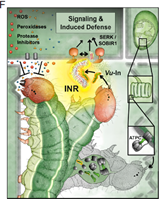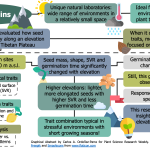A cell-surface receptor-like kinase mediates herbivore-sensing in legumes (Proc. Natl. Acad. Sci. USA)
 Inceptins are degraded fragments of host chloroplast ATP synthase subunit (cATPC) that are an important class of herbivore-associated molecular patterns (HAMPs). These peptides are abundant in herbivore oral secretions (OS). Using Vu-In, a conserved inceptin from cowpea, Steinbrenner and colleagues have identified a receptor-like kinase (RLK) that specifically senses inceptins in a subtribe of legumes. By studying responses to Vu-In and a weaker variant specially associated with legume family, the authors identified a locus encoding a leucine-rich repeat (LRR)-receptor-like protein (RLP). In agreement with Vu-In’s conservation in a subtribe of legumes closely related to cowpea, the INR locus also is confined to the subtribe. Further, by coimmunoprecipitation (Co-IP), the authors showed direct binding of INR to Vu-In and its association with a co-receptor and an adaptor kinase. Moreover, stable expression of INR in tobacco plants was sufficient to elicit defense responses against inceptin. (Summary by Pavithran Narayanan @pavi_narayanan) Proc. Natl. Acad. Sci. USA 10.1073/pnas.2018415117
Inceptins are degraded fragments of host chloroplast ATP synthase subunit (cATPC) that are an important class of herbivore-associated molecular patterns (HAMPs). These peptides are abundant in herbivore oral secretions (OS). Using Vu-In, a conserved inceptin from cowpea, Steinbrenner and colleagues have identified a receptor-like kinase (RLK) that specifically senses inceptins in a subtribe of legumes. By studying responses to Vu-In and a weaker variant specially associated with legume family, the authors identified a locus encoding a leucine-rich repeat (LRR)-receptor-like protein (RLP). In agreement with Vu-In’s conservation in a subtribe of legumes closely related to cowpea, the INR locus also is confined to the subtribe. Further, by coimmunoprecipitation (Co-IP), the authors showed direct binding of INR to Vu-In and its association with a co-receptor and an adaptor kinase. Moreover, stable expression of INR in tobacco plants was sufficient to elicit defense responses against inceptin. (Summary by Pavithran Narayanan @pavi_narayanan) Proc. Natl. Acad. Sci. USA 10.1073/pnas.2018415117



